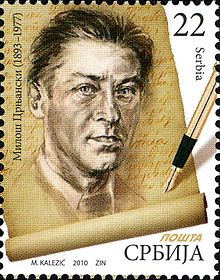Miloš Crnjanski
| Miloš Crnjanski | |
|---|---|

Miloš Crnjanski on a 2010 Serbian stamp
|
|
| Born | 26 October 1893 Csongrád, Austria-Hungary |
| Died | 30 November 1977 (aged 84) Belgrade, SFR Yugoslavia |
| Occupation | Poet, writer, journalist, diplomat |
| Language | Serbian |
| Nationality | Serbian |
| Alma mater | University of Vienna, University of Belgrade |
| Period | Avant Garde |
| Literary movement | Expressionism |
| Notable works | Migrations, Lament over Belgrade, The Journal of Carnojevic, A novel about London |
| Spouse | Vida Ružić |
Miloš Crnjanski (in Serbian Cyrillic: Милош Црњански, pronounced [mîlɔʃ t͡srɲǎnskiː]; 26 October 1893 – 30 November 1977) was a poet of the expressionist wing of Serbian modernism, author, and a diplomat. From his beginnings as a journalist whose social-political stance was at one moment openly opposed to freedom and progress, he gradually arose to become a poet and romanticist.
Crnjanski was born in Csongrád, Hungary, to an impoverished family which moved in 1896 to Temesvár (today Timişoara, Romania) where he grew up in a patriarchal-patriotic community with the implanted cult of Serbia and Serbian heritage in his soul as a precious relic. One of the deepest and longest lasting sensations of his childhood were those with national and religious content: church school, St. Sava icon, incense, the Serbian Orthodox cemetery with its burial ceremonies, evening stories and songs about Serbia, hajduks, and Ottoman Turkish oppression – all of it in a boy's emotions transferred into continual unrest, but also became an everlasting source of hope, joy, doubt, disappointment and rebelliousness. He completed the elementary school in Pančevo, and Grammar school in Timişoara. Then he started attending the Export academy in Rijeka in 1912, and in the autumn of the following year he started studying in Vienna.
At the beginning of World War I, Crnjanski was persecuted as part of the general anti-Serbian retribution of Austria to Princip's assassination in Sarajevo, but instead of being sent to jail, he was drafted to army and sent to Galician frontline to fight against the Russians where he was wounded in 1915. During most of these tragic war days, Crnjanski spent time alone in a Vienna war hospital, although just before the end of the war he was sent to the Italian front. In his memory, sights of the havoc of war were impressed unerasably. After the war, he completed his studies of art history and philosophy in Vienna and graduated from the University of Belgrade as one of the students of the famous literature critic Bogdan Popovic.
...
Wikipedia
